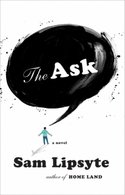
[Farrar, Straus, & Giroux; 2010]
Milo Burke, the star of Sam Lipsyte’s third novel, The Ask, is a misanthrope, a “hater’s hater,” and America, with its soggy yellow eyes and faded dream, has nothing left to offer him.
Recently fired from his “good shitty job,” raising piddling funds at a mediocre university in New York City, Milo spends his days in subways and sandwich shops, popping painkillers and counting down the hours until dinnertime. But as he lingers in his neighborhood doughnut spot, contemplating a world without himself, Milo’s phone begins to vibrate. He has been granted a stay of execution. Milo’s old college friend Purdy, now a venture capitalist with a penchant for jellybeans and models, is considering making a large donation to the university, but first he has a request of his own.
Armed with nothing but turkey wraps and bitter invectives, Milo proceeds like a jaded knight-errant, taking down a slew of foes both large and small — children, parents, grandparents, forefathers — all while trying to satisfy a legless veteran, a “touched out” wife, and a preschool son who has already begun to learn what a depressive pansy his father can be.
“Here’s what you need to know,” Milo tells his son about a familiar tale:
The boy can walk away from the ogre’s castle. He doesn’t have to knock. Some people will tell you that it’s better the boy get hurt or even die than never know whether he could have defeated the ogre and won the ogre’s treasure. But those are the people who tell us stories to keep us slaves.
To which his son replies, “Can I have stegosaurus cake for my birthday like Jeremy got?” The road leading away from the castle — from endless striving and genuflection — is a lonesome one. But Lipsyte ensures that it’s full of bumps and curves.
Women in tight slacks charged past to the subway, supple organic forms supplemented with technological grafts—earphones, telephones, wraparound shades. I watched them and recalled those cyborg liberation essays from the postmodern feminism class I took in college. I’d run home after every lecture, jerk off on my futon in a fever dream of blinking vaginas.
Milo prefers rants to stories, and at times, when his targets are too old or tired for a satisfying kill, it can feel like you’ve been cornered at a party by an obnoxious drunk. Worse is when a moment of sincerity begins to build, only to be expelled by Milo’s sensitive gag reflex. But Milo is aware of these shortcomings. “If I were the protagonist of a book or a movie,” he asks his fleshy boss, Vargina, “it would be hard to like me, to identify with me, right?” Milo Burke may not be in the running for the Nobel Peace Prize, but he’s a shoo-in for Hater of the Year.
This post may contain affiliate links.








